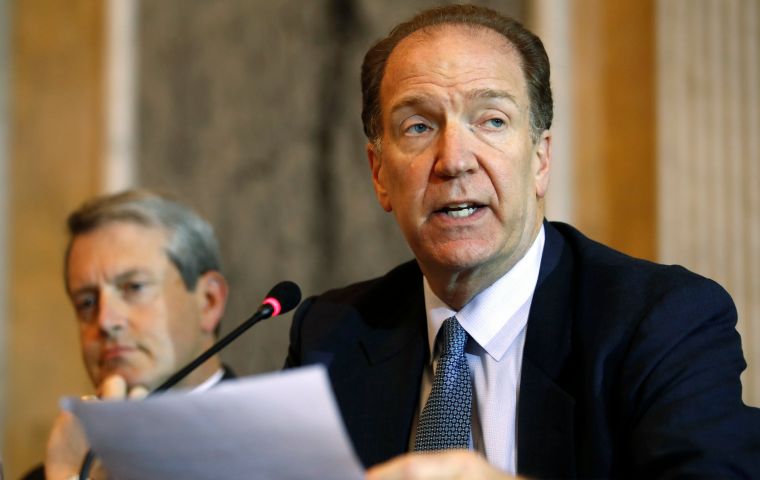MercoPress. South Atlantic News Agency
Global growth fragile influenced by trade conflict and tumbling confidence, reports World Bank
 Newly-installed World Bank President David Malpass, said global growth is “fragile” and the slowdown jeopardizes progress in battling world poverty.
Newly-installed World Bank President David Malpass, said global growth is “fragile” and the slowdown jeopardizes progress in battling world poverty. The World Bank slashed its global growth forecasts for this year in a report released on Tuesday that portrayed a world gripped by deepening trade conflict, tumbling confidence and increasingly skittish investment. Although the global development lender currently expects a modest recovery 2020 and 2021, the bank said in its semi-annual report that a lot will have to go right for this to happen.
Instead the growing risks suggest the outlook could instead grow darker still.
The greatest danger on the horizon is the prospect of worsening trade clashes between major world economies - a specter that rose again last week when US President Donald Trump announced fresh punitive duties on Mexican goods in a dispute over immigration policy.
The world economy is now expected to expand by 2.6 per cent this year, three tenths of a percentage point lower than the January forecast, and well below the three percent growth seen in 2018, according to the Global Economic Prospects report.
The World Bank also sounded the alarm about rising debt levels and warned emerging economies they could soon regret the decision to borrow in search of a growth boost.
Newly-installed World Bank President David Malpass, who in his previous position with the US Treasury participated in Trump's stalled trade negotiations with China, said global growth is “fragile” and the slowdown jeopardizes progress in battling world poverty.
“The global economic outlook, in both the near and long term, is confronting substantial challenges,” he told reporters.
The new forecast was decidedly gloomier than the latest outlook by the International Monetary Fund, released in April, but which likewise predicted a slowdown and warned of the risks posed by trade conflicts.
“The bottom line is that the global economy is coming to a crossroads,” said World Bank economist Ayhan Kose, who oversaw the report. “We need to find ways to stabilize growth and I think further escalation of these trade tensions is now the number one risk that could actually weigh on the outlook,”
World trade volume also is expected to drop off sharply, growing by 2.6% this year, the slowest pace since the global financial crisis and a full percentage point lower than January's forecast.
In East Asia and the Pacific, total economic output is likely to drop below six percent for the first time since the Asian financial crisis more than 20 years ago.
China's forecast is little changed, with growth projected to slow to 6.2 per cent this year.
The forecast for the United States is unchanged, with GDP growth slowing to 2.5 per cent this year before weakening to 1.7 per cent in 2020, though still considerably stronger than other advanced economies.
But American exports to Europe and Asia have seen an “especially acute” slowdown, and conditions in the Euro zone economic have “deteriorated rapidly” as exports to China, central Asia and elsewhere have shrunk, according to the report.
Latin America's top two economies, Brazil and Mexico, have taken sharp turns for the worse. The forecast also sliced 0.7 per cent off its outlook for Brazil, cutting it to 1.5 per cent.
Kose highlighted concerns over rising debt, saying that since 2007 sovereign debt among emerging and developing economies had risen on average by 15 per cent.
These countries should be “extremely careful” not to allow current low interest rates to entice them into overindulging in more debt, and should instead opt for more reforms that can stimulate investment.
“When you accumulate debt, it makes you more vulnerable to crisis, it limits your policy space and then ultimately, you never know when the interest rate's going to increase,” he said.
The world economy is now expected to expand by 2.6 per cent this year, three tenths of a percentage point lower than the January forecast, and well below the three percent growth seen in 2018, according to the Global Economic Prospects report.
The World Bank also sounded the alarm about rising debt levels and warned emerging economies they could soon regret the decision to borrow in search of a growth boost.




Top Comments
Disclaimer & comment rulesCommenting for this story is now closed.
If you have a Facebook account, become a fan and comment on our Facebook Page!